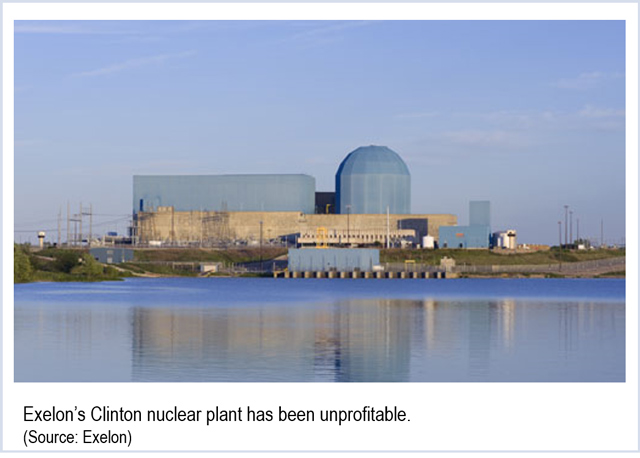By Suzanne Herel
Exelon’s year-long lobbying campaign has won bipartisan backing for a bill that would charge Illinois electricity users a fee to ensure continued operation of three nuclear generators that the company says are unprofitable.
The proposal could increase Commonwealth Edison and Ameren bills by $300 million a year, according to the Citizens Utility Board, a consumer watchdog group.

Both proposals say they will increase renewable energy and jobs while lowering carbon emissions as required by the U.S. Environmental Protection Agency’s Clean Power Plan. Both have bipartisan support.
Exelon says its plan would ensure the operation of the state’s nuclear power plants, which produce nearly half of Illinois’ power, provide more than 5,900 jobs and represent $9 billion in economic impact.
“There is simply no way Illinois will achieve meaningful carbon reductions and meet the EPA goals without preserving our current nuclear fleet,” said state Rep. Larry Walsh Jr., a Democrat who represents many nuclear plant workers in his Will County district and co-sponsored HB3293.
Walsh told the Chicago Tribune that the final proposal likely would represent a compromise bill hammered out with the proponents of the Clean Energy Jobs Bill. He could not be reached for comment on Friday.
That bill and its companion were introduced by state Sen. Don Harmon and Rep. Elaine Nekritz, both Democrats.
“If we can raise the energy efficiency standard to 20% and raise the renewable portfolio standard to 35%, we can create 32,000 new clean energy jobs every year,” Harmon said in introducing his bill. “The potential for Illinois if we act is great — and at the same time, the risk if we fail to act is enormous.”
The Exelon legislation was drafted in response to a 269-page, House-commissioned report released Jan. 8 that presented options to improve the finances of Exelon’s nuclear power plants. (See Exelon in Lobbying Push to Save Ill. Nukes.)
Under the proposed legislation, beginning next year, 70% of the electricity delivered by ComEd, which is owned by Exelon, and Ameren would have to be generated by “clean-energy” sources: solar, wind, hydro, nuclear, tidal, wave and clean coal.
The fee to customers would fund low-carbon energy credits that would be auctioned by the Illinois Power Agency.
The system would result in an average $2/month surcharge to electricity bills, not to exceed a 2.015% annual increase compared with 2009 rates. It would sunset at the end of 2021, or earlier if the state is in compliance with the EPA’s program.
While Exelon has said the legislation is needed to save the nuclear plants it maintains are struggling – Byron, Quad Cities and Clinton — the bill does not require the company to keep them open even if the new standard is adopted.
Critics of the power company’s proposal point to a Crain’s Chicago Business study of Exelon’s Securities and Exchange Commission filings that concluded its nuclear fleet is profitable. Exelon has declined to open its books to prove its contention.
“Exelon has made more than $20 billion in profits over the past decade, its overall nuclear fleet is profitable — and consumers have already paid for those plants several times over, from when the facilities were owned by ComEd,” said David Kolata, executive director of the Citizens Utility Board. “The solution to Illinois’ energy issues requires a much more comprehensive and long-term plan than Exelon’s proposal, which would raise ComEd and Ameren electric bills by an estimated $300 million a year.”
Exelon Senior Vice President Joseph Dominguez addressed the profits issue in an interview with Northern Public Radio.
“No one from Exelon has ever denied that the company is profitable. It is,” he said. “What we’re talking about is the profitability of units that are persistently losing money and our inability to keep those units open unless we recognize the important attributes that they provide.”


